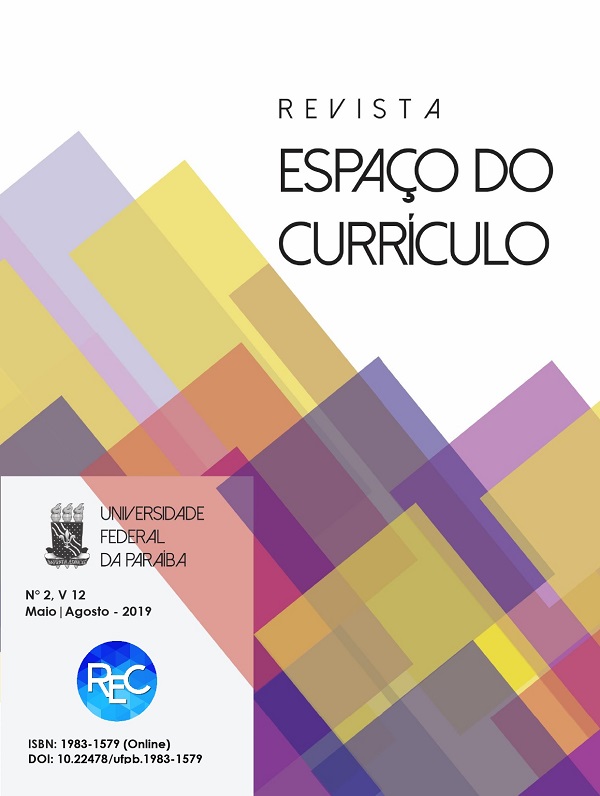IF YOU DON'T KNOW IN ADVANCE HOW SOMEONE WILL LEARN, HOW TO EVALUATE IN CHILD EDUCATION?
DOI:
https://doi.org/10.22478/ufpb.1983-1579.2019v12n2.40925Keywords:
Early Childhood Education., Evaluation., National Common Curricular Base., Inventive learning.Abstract
In times of implementation of the National Curricular Common Base (BNCC), which interferes directly in the tripod Curriculum, Teacher Training and Evaluation, this article questions the evaluation procedures in addition to a classification logic. As a problematic field questions how to establish, in advance, evaluation criteria for Early Childhood Education, if one never knows in advance how one will learn? As theoretical intercessors mobilizes the studies of Carvalho (2009, 2012); Deleuze (2003; 2007); Esteban; Lacerda (2012); Kohan (2005); Lopes (2015); Sousa (1997, 2014). Methodologically, it organizes a documentary problematization, based on the educational legislation for Early Childhood Education and the BNCC, as well as for the follow-up of the records of other possible writings of the learning processes produced by teachers of a Child Education Center of the Federal University of Espírito Santo.First, it presents a brief history of how legislative and evaluation processes were constituted in Early Childhood Education; later, it talks about learning and evaluation as a processual and relational; makes a bet on the inventive learning provided by the encounters in everyday school life; Finally, it criticizes the imposition of previously established criteria for the evaluation of childhood learning, such as those that stand out in the BNCC. Therefore, there is no way to determine how someone learns, and it is necessary to invest in evaluation processes where teachers and students are co-authors of teaching and learning, in addition to the quantifiable and dichotomous logic that predominates in Education.
Downloads
Metrics
References
ALVES, Nilda (Org); MACEDO, Elizabeth F. de; OLIVEIRA, Inês Barbosa de; MANHÃES, Luis Carlos S. Criar currículo no cotidiano. 3. ed. V. 1. São Paulo: Cortez, 2011.
BRASIL. Ministério da Educação. Base Nacional Comum Curricular. Brasília, DF: MEC, 2017.
BRASIL. Ministério da Educação. Educação Infantil: subsídios para construção de uma sistemática de avaliação. Brasília, DF: MEC, 2012. (Documento produzido pelo Grupo de Trabalho instituído pela Portaria nº 1.147/2011, do Ministério da Educação).
BRASIL. Emenda constitucional nº 59, de 11 de novembro de 2009. Diário Oficial da União, Brasília, 12 de novembro de 2009, Seção 1, p. 8.
BRASIL. Ministério da Educação. Conselho Nacional de Educação. Câmara de Educação Básica. Resolução CNE/CEB nº 5/2009. Fixa as Diretrizes Curriculares Nacionais para a Educação Infantil. Diário Oficial da União, Brasília, 18 de dezembro de 2009, Seção 1, p. 18.
BRITO, Maria dos Remédios. A subjetividade em desterritorialidade: traços imagéticos formativos. Congresso Internacional de Filosofia e Educação. Caxias do Sul, RS, maio de 2010.
CARVALHO, Janete Magalhães. Devir-docência potencializando a aprendizagem sem medo. XVI ENDIPE - Encontro Nacional de Didática e Práticas de Ensino. UNICAMP, Campinas, 2012.
CARVALHO, Janete Magalhães. O Cotidiano escolar como comunidade de afetos. Petrópolis, RJ: DP et alii; Brasília, DF: CNPq, 2009.
DELEUZE. Imagem-Tempo. 1985. Tradução de Eloisa de Araújo Ribeiro. Brasiliense. 1ª ed., 2007.
DELEUZE. Proust e os signos. 2. ed., trad. Antonio Piquet e Roberto Machado. Rio de Janeiro: Forense Universitária, 2003.
DELEUZE. O Abecedário Deleuze. 1988. Entrevista com Claire Parnet. Vídeo
DELEUZE, Giles; GUATTARI, Félix. Mil Platôs: capitalismo e esquizofrenia. Vol.1. Tradução: Aurélio Guerra Neto e Célia Pinto Costa. Rio de Janeiro: Ed. 34, 1995.
ESTEBAN; LACERDA. Em histórias cotidianas, convites ao encontro entre avaliação e aprendizagemensino. In: ALVES; LIBÂNEO (Orgs.). Temas de Pedagogia: diálogos entre didática e currículo. São Paulo: Cortez, 2012.
FERRAÇO, Carlos Eduardo et al. Currículos-docências-menores e pesquisas com os cotidianos escolares: Sobre possibilidades de escapes frente aos mecanismos de controle do Estado. In: ASSOCIAÇÃO NACIONAL DE PÓS-GRADUAÇÃO E PESQUISA EM EDUCAÇÃO (ANPED). GT 12: Currículo. São Luís, Maranhão: 1-5 out 2017.
FOUCAULT, Michel. Ditos e Escritos V: Ética, sexualidade, política. 2 ed. Tradução Elisa Monteiro, Inês Autran Dourado Barbosa. Rio de Janeiro: Forense Universitária, 2006.
KOHAN, Walter Omar. Infância. Entre educação e filosofia. Belo Horizonte: Autêntica, 2005.
LOPES, Alice Casimiro. Por um currículo sem fundamentos. Linhas Críticas. Brasília, DF, v.21, n.45, p. 445-466, mai./ago. 2015.
PASCHOAL, Jaqueline Delgado; MACHADO, Maria Cristina Gomes. A história da Educação Infantil no Brasil: avanços, retrocessos e desafios dessa modalidade educacional. Revista HISTEDBR On-line. Campinas, SP, v.9, n.33, p.78-95, mar. 2009.
SANTOS, Boaventura de Souza. Renovar a teoria crítica e reinventar a emancipação social. São Paulo: Boitempo, 2007.
SOUSA, Sandra Zákia. Avaliação Escolar e Democratização: o direito de errar. In: AQUINO, Júlio Groppa. (Org.). Erro e fracasso na escola: alternativas teóricas e práticas. São Paulo: Summus, 1997, p. 125-138.
SOUSA, Sandra Zákia. Concepções de qualidade da educação básica forjadas por meio de avaliações em larga escala. Avaliação, Campinas; Sorocaba, SP, v. 19, n. 2, p. 407-420, jul. 2014.
Downloads
Published
How to Cite
Issue
Section
License
By submitting an article to Curriculum Space Journal (CSJ) and having it approved, the authors agree to assign, without remuneration, the following rights to Curriculum Space Journal: first publication rights and permission for CSJ to redistribute this article. article and its metadata to the indexing and reference services that its editors deem appropriate.
















